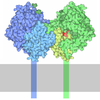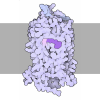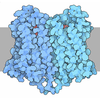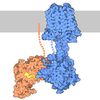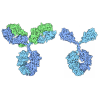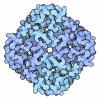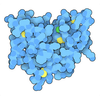+ Open data
Open data
- Basic information
Basic information
| Entry | Database: PDB / ID: 8xgo | ||||||||||||||||||||||||
|---|---|---|---|---|---|---|---|---|---|---|---|---|---|---|---|---|---|---|---|---|---|---|---|---|---|
| Title | a peptide receptor complex structure | ||||||||||||||||||||||||
 Components Components |
| ||||||||||||||||||||||||
 Keywords Keywords | STRUCTURAL PROTEIN/IMMUNE SYSTEM / a peptide related GPCR-Gq complex / STRUCTURAL PROTEIN / STRUCTURAL PROTEIN-IMMUNE SYSTEM complex | ||||||||||||||||||||||||
| Function / homology |  Function and homology information Function and homology informationFatty Acids bound to GPR40 (FFAR1) regulate insulin secretion / Acetylcholine regulates insulin secretion / neuropeptide receptor activity / phospholipase C-activating G protein-coupled glutamate receptor signaling pathway / PLC beta mediated events / phospholipase C-activating serotonin receptor signaling pathway / regulation of platelet activation / entrainment of circadian clock / G protein-coupled peptide receptor activity / regulation of canonical Wnt signaling pathway ...Fatty Acids bound to GPR40 (FFAR1) regulate insulin secretion / Acetylcholine regulates insulin secretion / neuropeptide receptor activity / phospholipase C-activating G protein-coupled glutamate receptor signaling pathway / PLC beta mediated events / phospholipase C-activating serotonin receptor signaling pathway / regulation of platelet activation / entrainment of circadian clock / G protein-coupled peptide receptor activity / regulation of canonical Wnt signaling pathway / glutamate receptor signaling pathway / phototransduction, visible light / photoreceptor outer segment / neuropeptide signaling pathway / postsynaptic cytosol / enzyme regulator activity / response to prostaglandin E / GTPase activator activity / Peptide ligand-binding receptors / Turbulent (oscillatory, disturbed) flow shear stress activates signaling by PIEZO1 and integrins in endothelial cells / G protein-coupled receptor binding / G-protein beta/gamma-subunit complex binding / Olfactory Signaling Pathway / adenylate cyclase-activating G protein-coupled receptor signaling pathway / Activation of the phototransduction cascade / G beta:gamma signalling through PLC beta / Presynaptic function of Kainate receptors / Thromboxane signalling through TP receptor / G protein-coupled acetylcholine receptor signaling pathway / Activation of G protein gated Potassium channels / Inhibition of voltage gated Ca2+ channels via Gbeta/gamma subunits / G-protein activation / blood coagulation / G beta:gamma signalling through CDC42 / Prostacyclin signalling through prostacyclin receptor / Glucagon signaling in metabolic regulation / G beta:gamma signalling through BTK / Synthesis, secretion, and inactivation of Glucagon-like Peptide-1 (GLP-1) / ADP signalling through P2Y purinoceptor 12 / photoreceptor disc membrane / Sensory perception of sweet, bitter, and umami (glutamate) taste / Glucagon-type ligand receptors / Adrenaline,noradrenaline inhibits insulin secretion / Vasopressin regulates renal water homeostasis via Aquaporins / Glucagon-like Peptide-1 (GLP1) regulates insulin secretion / G alpha (z) signalling events / ADP signalling through P2Y purinoceptor 1 / cellular response to catecholamine stimulus / ADORA2B mediated anti-inflammatory cytokines production / G beta:gamma signalling through PI3Kgamma / adenylate cyclase-activating dopamine receptor signaling pathway / Cooperation of PDCL (PhLP1) and TRiC/CCT in G-protein beta folding / GPER1 signaling / G-protein beta-subunit binding / cellular response to prostaglandin E stimulus / heterotrimeric G-protein complex / Inactivation, recovery and regulation of the phototransduction cascade / G alpha (12/13) signalling events / extracellular vesicle / sensory perception of taste / Thrombin signalling through proteinase activated receptors (PARs) / signaling receptor complex adaptor activity / G protein activity / retina development in camera-type eye / GTPase binding / Ca2+ pathway / fibroblast proliferation / High laminar flow shear stress activates signaling by PIEZO1 and PECAM1:CDH5:KDR in endothelial cells / nuclear membrane / G alpha (i) signalling events / G alpha (s) signalling events / phospholipase C-activating G protein-coupled receptor signaling pathway / G alpha (q) signalling events / Hydrolases; Acting on acid anhydrides; Acting on GTP to facilitate cellular and subcellular movement / Ras protein signal transduction / Extra-nuclear estrogen signaling / cell population proliferation / protein stabilization / cilium / G protein-coupled receptor signaling pathway / lysosomal membrane / intracellular membrane-bounded organelle / GTPase activity / synapse / GTP binding / protein-containing complex binding / cell surface / Golgi apparatus / signal transduction / extracellular exosome / metal ion binding / membrane / plasma membrane / cytosol / cytoplasm Similarity search - Function | ||||||||||||||||||||||||
| Biological species |  Homo sapiens (human) Homo sapiens (human)synthetic construct (others) | ||||||||||||||||||||||||
| Method | ELECTRON MICROSCOPY / single particle reconstruction / cryo EM / Resolution: 2.68 Å | ||||||||||||||||||||||||
 Authors Authors | Wu, Z. / Du, Y. / Chen, G. | ||||||||||||||||||||||||
| Funding support | 1items
| ||||||||||||||||||||||||
 Citation Citation |  Journal: Sci Adv / Year: 2024 Journal: Sci Adv / Year: 2024Title: Structural basis for the ligand recognition and G protein subtype selectivity of kisspeptin receptor. Authors: Zhangsong Wu / Geng Chen / Chen Qiu / Xiaoyi Yan / Lezhi Xu / Shirui Jiang / Jun Xu / Runyuan Han / Tingyi Shi / Yiming Liu / Wei Gao / Qian Wang / Jiancheng Li / Fang Ye / Xin Pan / Zhiyi ...Authors: Zhangsong Wu / Geng Chen / Chen Qiu / Xiaoyi Yan / Lezhi Xu / Shirui Jiang / Jun Xu / Runyuan Han / Tingyi Shi / Yiming Liu / Wei Gao / Qian Wang / Jiancheng Li / Fang Ye / Xin Pan / Zhiyi Zhang / Peiruo Ning / Binghao Zhang / Jing Chen / Yang Du /     Abstract: Kisspeptin receptor (KISS1R), belonging to the class A peptide-GPCR family, plays a key role in the regulation of reproductive physiology after stimulation by kisspeptin and is regarded as an ...Kisspeptin receptor (KISS1R), belonging to the class A peptide-GPCR family, plays a key role in the regulation of reproductive physiology after stimulation by kisspeptin and is regarded as an attractive drug target for reproductive diseases. Here, we demonstrated that KISS1R can couple to the G pathway besides the well-known G pathway. We further resolved the cryo-electron microscopy (cryo-EM) structure of KISS1R-G and KISS1R-G complexes bound to the synthetic agonist TAK448 and structure of KISS1R-G complex bound to the endogenous agonist KP54. The high-resolution structures provided clear insights into mechanism of KISS1R recognition by its ligand and can facilitate the design of targeted drugs with high affinity to improve treatment effects. Moreover, the structural and functional analyses indicated that conformational differences in the extracellular loops (ECLs), intracellular loops (ICLs) of the receptor, and the "wavy hook" of the Gα subunit may account for the specificity of G protein coupling for KISS1R signaling. | ||||||||||||||||||||||||
| History |
|
- Structure visualization
Structure visualization
| Structure viewer | Molecule:  Molmil Molmil Jmol/JSmol Jmol/JSmol |
|---|
- Downloads & links
Downloads & links
- Download
Download
| PDBx/mmCIF format |  8xgo.cif.gz 8xgo.cif.gz | 220.6 KB | Display |  PDBx/mmCIF format PDBx/mmCIF format |
|---|---|---|---|---|
| PDB format |  pdb8xgo.ent.gz pdb8xgo.ent.gz | 169.4 KB | Display |  PDB format PDB format |
| PDBx/mmJSON format |  8xgo.json.gz 8xgo.json.gz | Tree view |  PDBx/mmJSON format PDBx/mmJSON format | |
| Others |  Other downloads Other downloads |
-Validation report
| Summary document |  8xgo_validation.pdf.gz 8xgo_validation.pdf.gz | 1.3 MB | Display |  wwPDB validaton report wwPDB validaton report |
|---|---|---|---|---|
| Full document |  8xgo_full_validation.pdf.gz 8xgo_full_validation.pdf.gz | 1.3 MB | Display | |
| Data in XML |  8xgo_validation.xml.gz 8xgo_validation.xml.gz | 49.2 KB | Display | |
| Data in CIF |  8xgo_validation.cif.gz 8xgo_validation.cif.gz | 73.8 KB | Display | |
| Arichive directory |  https://data.pdbj.org/pub/pdb/validation_reports/xg/8xgo https://data.pdbj.org/pub/pdb/validation_reports/xg/8xgo ftp://data.pdbj.org/pub/pdb/validation_reports/xg/8xgo ftp://data.pdbj.org/pub/pdb/validation_reports/xg/8xgo | HTTPS FTP |
-Related structure data
| Related structure data |  38329MC  8xgsC  8xguC M: map data used to model this data C: citing same article ( |
|---|---|
| Similar structure data | Similarity search - Function & homology  F&H Search F&H Search |
- Links
Links
- Assembly
Assembly
| Deposited unit | 
|
|---|---|
| 1 |
|
- Components
Components
-Guanine nucleotide-binding protein ... , 3 types, 3 molecules BCE
| #2: Protein | Mass: 39286.891 Da / Num. of mol.: 1 Source method: isolated from a genetically manipulated source Source: (gene. exp.)  Homo sapiens (human) / Gene: GNB1 Homo sapiens (human) / Gene: GNB1Production host:  Spodoptera aff. frugiperda 1 BOLD-2017 (butterflies/moths) Spodoptera aff. frugiperda 1 BOLD-2017 (butterflies/moths)References: UniProt: P62873 |
|---|---|
| #3: Protein | Mass: 7851.123 Da / Num. of mol.: 1 Source method: isolated from a genetically manipulated source Source: (gene. exp.)  Homo sapiens (human) / Gene: GNG2 Homo sapiens (human) / Gene: GNG2Production host:  Spodoptera aff. frugiperda 1 BOLD-2017 (butterflies/moths) Spodoptera aff. frugiperda 1 BOLD-2017 (butterflies/moths)References: UniProt: P59768 |
| #5: Protein | Mass: 41381.129 Da / Num. of mol.: 1 Source method: isolated from a genetically manipulated source Source: (gene. exp.)  Homo sapiens (human) / Gene: GNAQ, GAQ Homo sapiens (human) / Gene: GNAQ, GAQProduction host:  Spodoptera aff. frugiperda 1 BOLD-2017 (butterflies/moths) Spodoptera aff. frugiperda 1 BOLD-2017 (butterflies/moths)References: UniProt: P50148 |
-Protein / Antibody / Protein/peptide , 3 types, 3 molecules ADF
| #1: Protein | Mass: 42631.965 Da / Num. of mol.: 1 Source method: isolated from a genetically manipulated source Source: (gene. exp.)  Homo sapiens (human) / Gene: KISS1R, AXOR12, GPR54 Homo sapiens (human) / Gene: KISS1R, AXOR12, GPR54Production host:  Spodoptera aff. frugiperda 1 BOLD-2017 (butterflies/moths) Spodoptera aff. frugiperda 1 BOLD-2017 (butterflies/moths)References: UniProt: Q969F8 |
|---|---|
| #4: Antibody | Mass: 27707.885 Da / Num. of mol.: 1 Source method: isolated from a genetically manipulated source Source: (gene. exp.)  Homo sapiens (human) Homo sapiens (human)Production host:  Spodoptera aff. frugiperda 1 BOLD-2017 (butterflies/moths) Spodoptera aff. frugiperda 1 BOLD-2017 (butterflies/moths) |
| #6: Protein/peptide | Mass: 1208.350 Da / Num. of mol.: 1 / Source method: obtained synthetically / Source: (synth.) synthetic construct (others) |
-Details
| Has ligand of interest | Y |
|---|---|
| Has protein modification | Y |
-Experimental details
-Experiment
| Experiment | Method: ELECTRON MICROSCOPY |
|---|---|
| EM experiment | Aggregation state: PARTICLE / 3D reconstruction method: single particle reconstruction |
- Sample preparation
Sample preparation
| Component |
| ||||||||||||||||||||||||||||||
|---|---|---|---|---|---|---|---|---|---|---|---|---|---|---|---|---|---|---|---|---|---|---|---|---|---|---|---|---|---|---|---|
| Molecular weight | Value: 0.13 MDa / Experimental value: YES | ||||||||||||||||||||||||||||||
| Source (natural) | Organism:  Homo sapiens (human) Homo sapiens (human) | ||||||||||||||||||||||||||||||
| Source (recombinant) | Organism:  Spodoptera aff. frugiperda 1 BOLD-2017 (butterflies/moths) Spodoptera aff. frugiperda 1 BOLD-2017 (butterflies/moths) | ||||||||||||||||||||||||||||||
| Buffer solution | pH: 7.5 | ||||||||||||||||||||||||||||||
| Specimen | Conc.: 5 mg/ml / Embedding applied: NO / Shadowing applied: NO / Staining applied: NO / Vitrification applied: YES | ||||||||||||||||||||||||||||||
| Vitrification | Cryogen name: ETHANE |
- Electron microscopy imaging
Electron microscopy imaging
| Experimental equipment |  Model: Titan Krios / Image courtesy: FEI Company |
|---|---|
| Microscopy | Model: FEI TITAN KRIOS |
| Electron gun | Electron source:  FIELD EMISSION GUN / Accelerating voltage: 300 kV / Illumination mode: FLOOD BEAM FIELD EMISSION GUN / Accelerating voltage: 300 kV / Illumination mode: FLOOD BEAM |
| Electron lens | Mode: BRIGHT FIELD / Nominal defocus max: 2000 nm / Nominal defocus min: 1200 nm |
| Image recording | Electron dose: 1.13 e/Å2 / Film or detector model: GATAN K3 BIOQUANTUM (6k x 4k) |
- Processing
Processing
| EM software |
| ||||||||||||||||||||||||
|---|---|---|---|---|---|---|---|---|---|---|---|---|---|---|---|---|---|---|---|---|---|---|---|---|---|
| CTF correction | Type: PHASE FLIPPING AND AMPLITUDE CORRECTION | ||||||||||||||||||||||||
| Particle selection | Num. of particles selected: 1295570 | ||||||||||||||||||||||||
| 3D reconstruction | Resolution: 2.68 Å / Resolution method: FSC 0.143 CUT-OFF / Num. of particles: 1295570 / Symmetry type: POINT | ||||||||||||||||||||||||
| Refine LS restraints |
|
 Movie
Movie Controller
Controller





 PDBj
PDBj


